The US cult of Downton Abbey
- Published
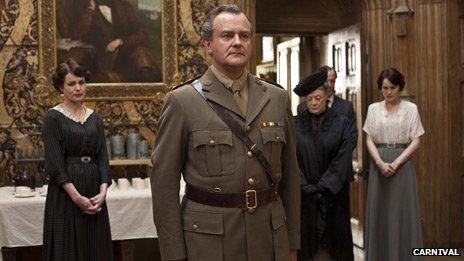
Downton Abbey has become a cult hit in the US, but what is it about this tale of life in an Edwardian country house that has got young viewers hooked?
It is hard to open a newspaper or click on a news website in America at the moment without reading something about ITV's Downton Abbey.
The second season has become a rare ratings hit for public service channel PBS, which has long carried British drama, including Downton's 1970s forerunner Upstairs, Downstairs.
American Downton fans organise Sunday night viewing parties, shell out on themed merchandise and chat endlessly about the latest plot twists on Twitter and Facebook.
News that Oscar-winning American actress Shirley MacLaine is to join the show for its third season has only added to the sense of excitement, even if some US critics have been a little sniffy about the second season, accusing it of being too slick and of wallowing in nostalgia.
Gossip blog Gawker called it "everyone's favorite buttoned-up British passionstravaganza, external", and entitled one post, external "Why Everyone in the Universe Should Watch Downton Abbey".
Website Salon suggested Occupy Wall Street supporters were among the fanbase, in a piece entitled "Why liberals love Downton Abbey, external". Salon also speculated that the show being broadcast first in the UK encouraged internet pirates in the US to illegally download the show.
MSNBC's Today programme told viewers how to dress like the characters, external, and there were reports that PBS had launched an "unauthorised" range of Downton Abbey jewellery, external.
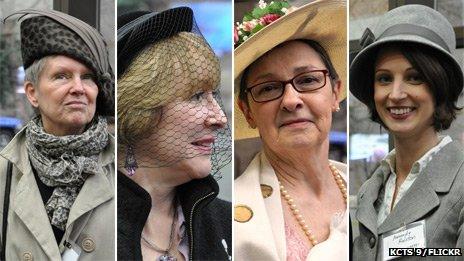
Seattle fans dressed up for the series two premiere
But not everybody is a fan. US-based British historian Simon Schama attacked the show, external in a Daily Beast piece, arguing it was a "steaming, silvered tureen of snobbery" and that its audience was an "American public desperate for something, anything, to take its mind off the perplexities of the present".
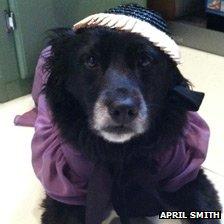
A New Jersey fan as Lady Mary
Rebecca Eaton, executive producer of PBS's Masterpiece strand, home of Downtown Abbey in the US, says ratings have continued to grow with each new episode, something that is rare in "mini-series television".
Download data from the PBS website suggests the show's popularity is being driven by a "substantially younger audience" than would normally tune in to British period drama.
"My instinct is that is really reaching down to young people. Of course women in their 20s and 30s, but also men and even younger kids still in school. Seventh graders have Downton parties," says Eaton.
So what exactly is it about Downton Abbey that has made it such a hit with young Americans?
Maggie Smith's killer one-liners
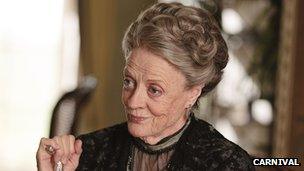
Lady Grantham steals the show for many viewers
Downton Abbey is packed with "fairly gorgeous-looking people in their twenties, both upstairs and downstairs," says Eaton. "It is a world and a group of people that you look at and you want to be part of."
But for many young fans of the show, the real star is 77-year-old Maggie Smith, who plays the imperious Countess of Grantham, queen of the withering putdown and raised eyebrow.
A compilation of the countess's best lines went viral on YouTube last month. Gawker described her as a "one woman insult machine".
"Everybody loves the Dowager Countess. She's the big breakout character in the comedy world," says Los Angeles-based comedian and actor Mike Still.
"Her one-liners and her performance are absolutely amazing."
Still, 31, had previously given period dramas a wide berth, particularly if they were shown on what used to be known as Masterpiece Theatre on PBS.
"That's the show that would be on at your grandparents' house if they didn't have cable, when you were a kid," he says.
But he was tipped off about Downton Abbey by a friend and is now hooked, spending his Sunday evenings tweeting fellow fans as he watches the latest instalment.
Yearning for a simpler time
Washington Post television critic Lisa de Moraes believes Downton Abbey has come along at exactly the right time for Americans craving stability and order during "tough economic times and cultural upheaval".
"They are buying into the notion of it being a simpler time and, in some odd way, a happier time. And a time of beautiful clothing. Don't underestimate that."
The series depicts an era that has only just slipped from living memory, and the events which form its backdrop, such as the sinking of the Titanic and World War I, make it feel less remote than other "crunchy gravel shows", as De Moraes has dubbed British period dramas.
That may be one reason why it has become a surprise hit, she suggests.
Schama attacked it for glossing over the harsher realities of life in Edwardian times and pandering to a cliched view of the English upper classes, but this may translate into easy escapism for some fans.
"It is not a documentary about the Edwardian era in England," argues Eaton.
She praises writer and creator Julian Fellowes for managing to ensure that whatever crises befall the characters they are "always working to do the right thing" and a solution is always found in the end.
Fascination with the class system
There is a long-held theory that Americans are intensely curious about the British class system - and there is no better place to see that in action than a British country house in the early years of the 20th Century.
"The class system is something completely alien to us," says Still.
But he adds: "I don't think there has ever been a time in my life when people are more fascinated with rich people and what their life is like. And this show may tap into some of that."
The Occupy movement and President Obama's attacks on income inequality have made many Americans think about the wealth gap for the first time, he argues.
"I think people really commiserate and identify with the [Downton Abbey] staff, because I think everybody feels like is this where we are going, in terms of an economy where the rich are this much richer than the poor."
Joy Engel, a 29-year-old Downton fan from New York, has a more straightforward view. "You are never going to meet anybody who is as insanely wealthy as the Crawleys. It's almost like a fantasy, seeing how people like that interact."
Political incorrectness
Downton Abbey offers a glimpse into a world of rigidly defined gender roles, where women had to know their place.
In one of the most quoted Lady Grantham zingers, the Dowager Countess hits back at the idea that Lady Sybil is entitled to her opinion: "No. She isn't until she is married, then her husband will tell her what her opinions are."
It is not a world many modern women would want to live in but, Engel admits, it can be fun to spend some time there.
"I have female friends who say they watch four or five episodes of Downton back-to-back.
"And they go up to their room and wonder why there's no man to pick out what clothes they are going to wear," she jokes.
Slick drama on free-to-air TV
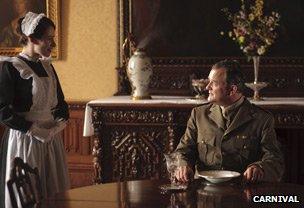
Where upstairs meets downstairs life
For some the appeal may be even simpler. Downton goes out on PBS, a free channel, to an audience used to seeing much of its expensive drama on paid-for cable channels.
Even its biggest fans will admit that Downton Abbey is, at heart, a soap opera - and a very modern one at that. Fellowes has said he was inspired by the fast pace and multi-layered story-telling of US cop show NYPD Blue.
"The whole thing is like a symphony," says Jennifer Yost, a 30-year-old Downton Abbey fan from Philadelphia.
"It's like an accessible fairytale you are watching - and all the pieces of it are so perfectly put together."
- Published21 September 2011
- Published30 January 2012
- Published18 January 2012